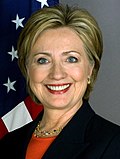Hillary Clinton | |
|---|---|
| Democratic Party candidate for President of the United States | |
| Election date 2008 | |
| Personal details | |
| Political party | Democratic Party |
| Website | www.hillaryclinton.com |
This is a list of prominent individuals and organizations who formally endorsed or voiced support for Hillary Clinton as the Democratic Party's presidential nominee for the 2008 U.S. presidential election.
Contents
- U.S. Presidents and Vice Presidents
- Senators
- U.S. Representatives
- Military
- National political figures
- Governors
- Family members of major political figures
- Mayors
- State and local officials
- Kentucky
- Maryland
- Ohio
- Oklahoma
- West Virginia
- Newspapers
- Writers
- Labor unions
- Political groups
- Entertainers
- Adult entertainment
- Individuals
- Athletes
- State officials
- Foreign political leaders
- See also
- References
- External links
| ||
|---|---|---|
Personal First Lady of Arkansas First Lady of the United States
U.S. Senator from New York U.S. Secretary of State Organizations | ||



